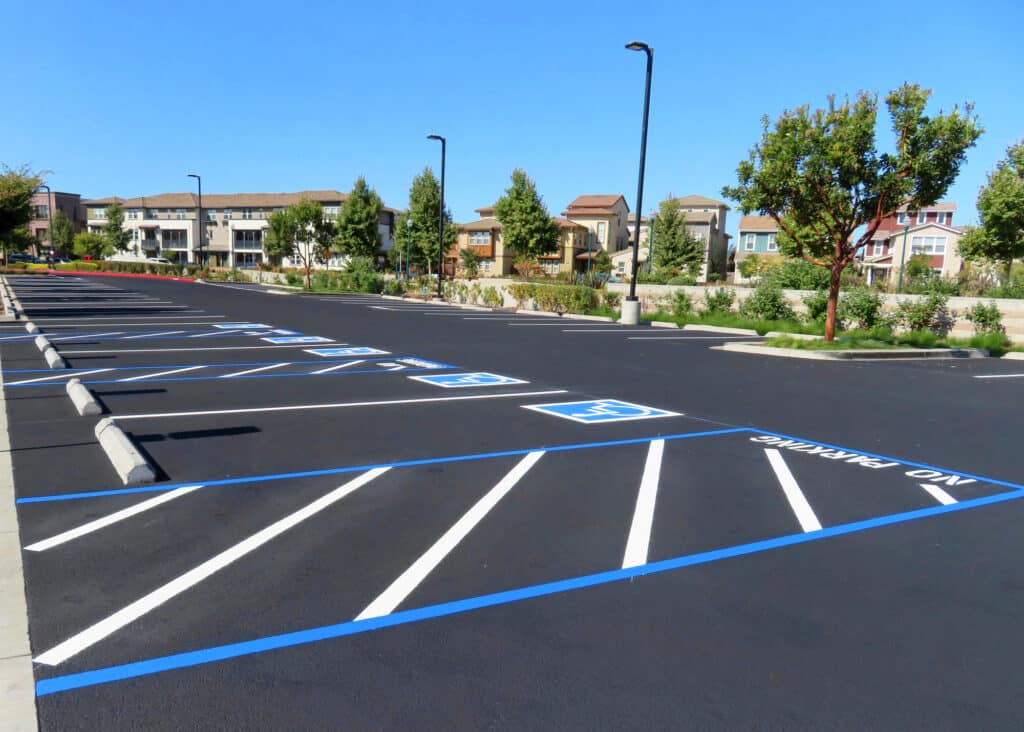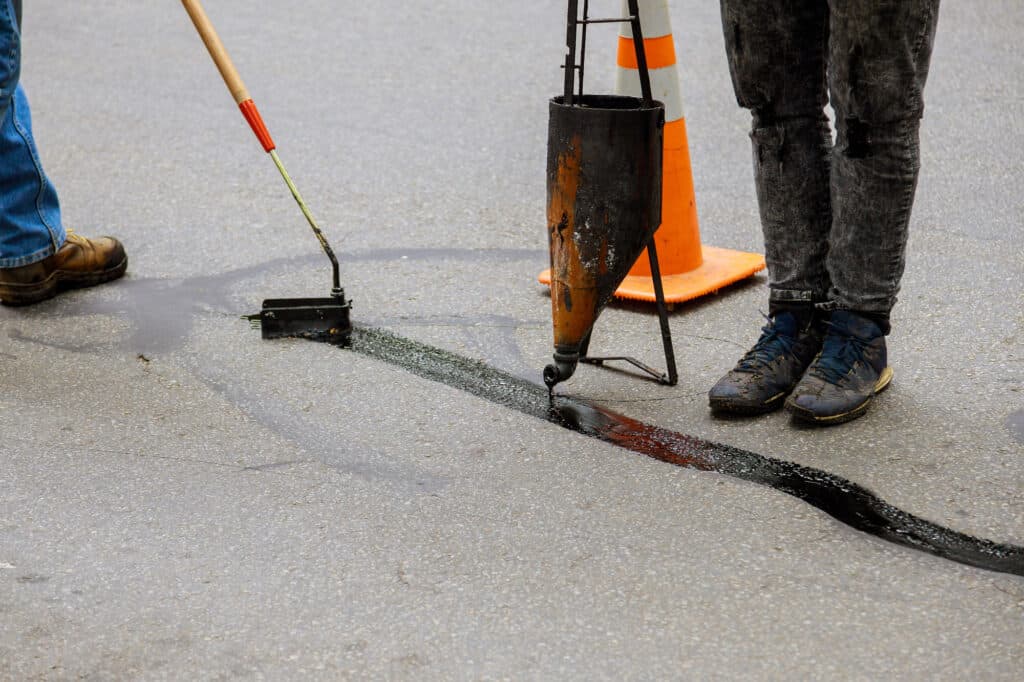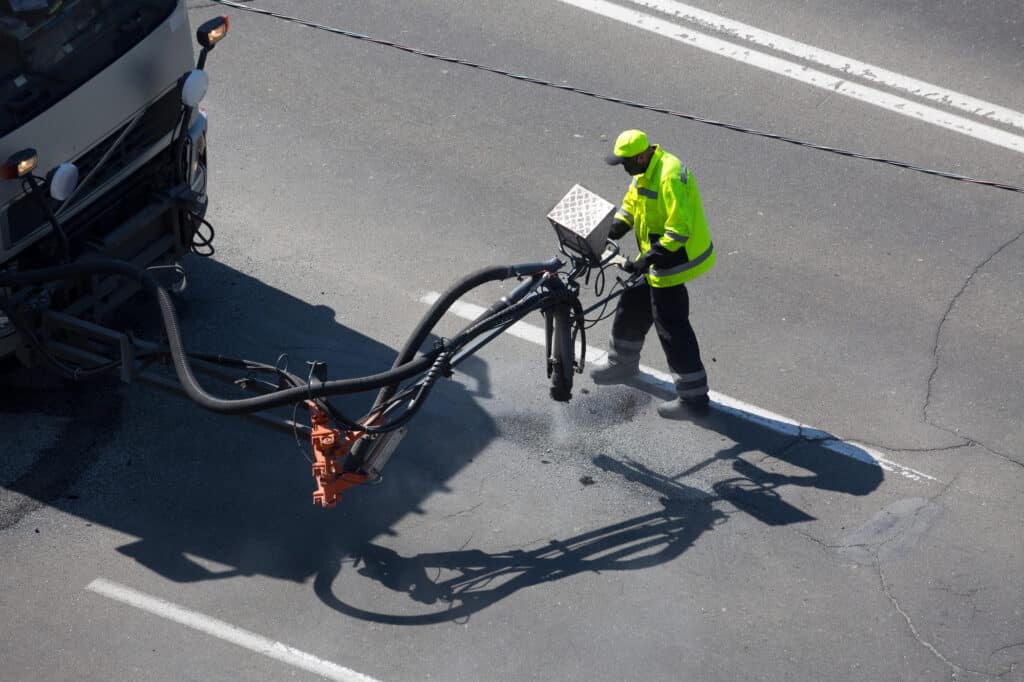Homeowners in Toronto are no strangers to the toll our weather can take on driveways. Between the city’s harsh freeze-thaw cycles and fluctuating temperatures, even the best-installed asphalt won’t last forever. Over time, cracks, fading, and surface deterioration are inevitable — but when the signs start showing, one key question arises: should you seal or resurface your asphalt?

The answer isn’t always obvious. Sealing and resurfacing are both valid solutions, but they serve different purposes depending on the condition of your driveway. Making the right decision at the right time can save you thousands of dollars, extend your driveway’s life, and improve your curb appeal. In this article, we’ll explore both options in detail, help you assess your driveway’s condition, and offer insights tailored to Toronto’s climate.
Understanding Asphalt Sealing
Asphalt sealing is a protective process that involves applying a liquid sealant over the surface of your driveway. The goal is to create a barrier that shields the asphalt from moisture, UV rays, oil stains, salt, and general wear.
This method is typically used as preventative maintenance. It doesn’t fix structural issues or deep cracks but can dramatically extend the lifespan of a driveway that’s in generally good condition. In Toronto, where road salt and freeze-thaw cycles wreak havoc on pavement, sealing every 2–3 years is often recommended by local experts.
When Is Sealing the Right Choice?
Sealing is ideal if your driveway is:
- Less than 10 years old
- Structurally sound with only minor surface cracks or fading
- Free of potholes or severe crumbling
- Looking dull or grey but still relatively smooth
If this sounds like your driveway, sealing is a cost-effective way to revive its appearance and reinforce its protection against the elements. It’s especially helpful for preventing water penetration, which can cause deeper damage when it freezes and expands beneath the surface.
When done at the right time, asphalt sealing & repair in Toronto can help prevent the need for more expensive interventions later on.
What Does Resurfacing Involve?

Resurfacing (also known as overlaying) is a more intensive process that involves removing the top layer of existing asphalt and replacing it with a fresh layer. Unlike sealing, which is cosmetic and preventative, resurfacing addresses structural issues on a moderate level.
This process doesn’t touch the foundation of the driveway — that’s a full replacement — but it can handle widespread cracking, shallow potholes, and uneven surfaces. It’s the go-to solution when sealing alone isn’t enough but a full reconstruction isn’t yet necessary.
When Should You Choose Resurfacing?
Resurfacing is best suited for driveways that are:
- Between 10–20 years old
- Structurally compromised but still have a solid base
- Covered in spider-web cracking or shallow potholes
- Uneven or sunken in places
One of the key benefits of resurfacing is that it provides a “like-new” appearance and functionality at a fraction of the cost of full replacement. In Toronto, where long winters and de-icing chemicals can accelerate deterioration, resurfacing is often recommended once a driveway starts showing consistent surface-level failures across large areas.
Key Differences at a Glance
| Feature | Asphalt Sealing | Resurfacing |
| Purpose | Preventative maintenance | Structural improvement |
| Cost | Low | Moderate |
| Time to complete | 1 day | 2–3 days |
| Lifespan improvement | +2–3 years per application | +10–15 years |
| Surface preparation | Minimal | Requires minor milling or repair |
| Aesthetic refresh | Yes | Yes, with smoother finish |
This comparison helps highlight that while sealing maintains and protects, resurfacing rejuvenates and repairs. Choosing the wrong option can lead to either wasted money or unresolved issues.
How Toronto’s Climate Influences Your Choice
Toronto’s climate isn’t kind to asphalt. The frequent freeze-thaw cycles — sometimes multiple times within a single week — create a constant push and pull within the pavement layers. Water seeps into cracks, freezes, expands, and worsens existing damage.
Sealing helps prevent water from entering the surface to begin with, which is why it’s essential to seal before winter hits. However, once cracks are beyond superficial, sealing becomes a band-aid solution.
If you’re noticing worsening cracks every spring, or if water is pooling in certain sections, resurfacing may be the more appropriate step. It’s a proactive way to stop the progression before it reaches the point of needing full replacement.
How to Evaluate Your Driveway’s Condition
Here are a few easy ways to assess whether sealing or resurfacing is the better choice:
- Perform a visual inspection: Are the cracks less than a quarter-inch wide? If yes, sealing is likely sufficient.
- Check for pooling or dips: These suggest underlying issues — resurfacing may be needed.
- Look at the edges: Crumbling or broken edges signal structural fatigue.
- Note the age of your driveway: If it’s older than 10–15 years and hasn’t been resurfaced, you might be past the sealing stage.
- Tap test: Walk on it and tap around — hollow sounds or bounce can signal sub-base problems, which neither sealing nor resurfacing will fix.
For a second opinion, many contractors offer free consultations or low-cost inspections to guide your decision.
Cost Considerations
In Toronto, average costs vary, but here’s a rough breakdown:
- Sealing: $0.35–$0.50 per square foot
- Resurfacing: $2.00–$4.00 per square foot
Sealing is often viewed as a smart investment if your driveway is still healthy, while resurfacing is a more long-term fix when the surface has begun to degrade. Keep in mind that delays in addressing damage can lead to more expensive repairs down the line.
For example, small cracks that aren’t sealed can turn into potholes, which might then lead to full-depth repair or replacement — costing upwards of $10 per square foot.
Finding a Reliable Contractor

Whether you’re leaning toward sealing or resurfacing, choosing a trustworthy contractor is essential. Look for teams that:
- Specialize in both sealing and resurfacing (not just one)
- Use commercial-grade sealants or hot-mix asphalt
- Offer clear warranties or guarantees
- Have solid local reviews or references
- Provide transparent, written estimates
Don’t be swayed by unusually low prices — they often indicate diluted sealant or poor-quality overlays. Look for companies that understand Toronto’s specific conditions and tailor their recommendations accordingly.
For guidance on where to start, this local asphalt sealing & repair service in Toronto offers tailored solutions backed by experience with the city’s unique weather patterns and road conditions.
The Right Choice Starts With the Right Timing
Choosing between asphalt sealing and resurfacing comes down to understanding your driveway’s current condition, the climate challenges of Toronto, and your long-term goals. Sealing is perfect for protection and cosmetic upgrades, while resurfacing offers a structural refresh when signs of wear have gone beyond the surface.
In either case, proactive care will always cost less than neglect. So if your driveway’s showing its age, now is the time to act — before the next winter makes the decision for you.
- 3shares
- Facebook0
- Pinterest0
- Twitter3
- Reddit0



